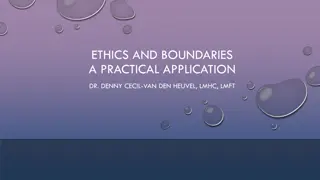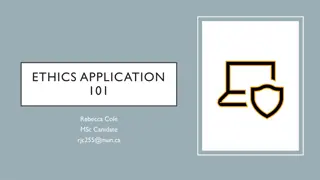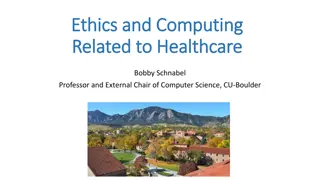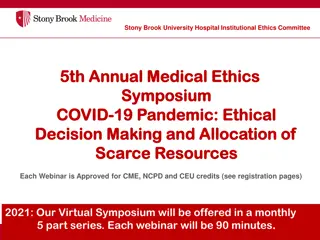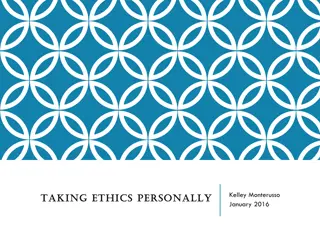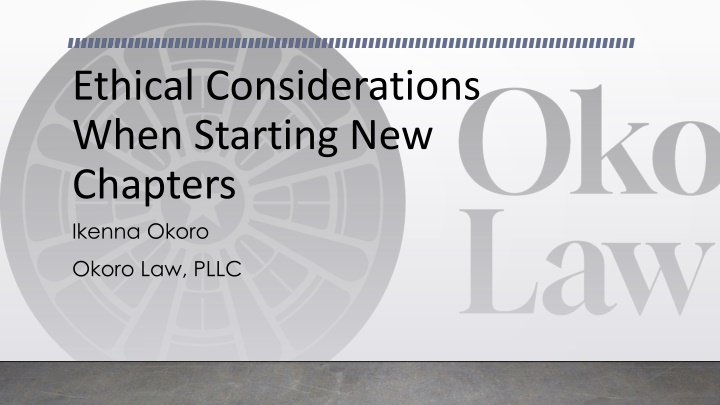
Navigating Legal Career Transitions: Ethical Considerations and Practical Insights
Explore the ethical considerations and practical insights when transitioning in the legal profession. From job changes to chapter beginnings, learn about key aspects such as client files protection, employment agreements, and professional conduct rules.
Download Presentation

Please find below an Image/Link to download the presentation.
The content on the website is provided AS IS for your information and personal use only. It may not be sold, licensed, or shared on other websites without obtaining consent from the author. If you encounter any issues during the download, it is possible that the publisher has removed the file from their server.
You are allowed to download the files provided on this website for personal or commercial use, subject to the condition that they are used lawfully. All files are the property of their respective owners.
The content on the website is provided AS IS for your information and personal use only. It may not be sold, licensed, or shared on other websites without obtaining consent from the author.
E N D
Presentation Transcript
Ethical Considerations When Starting New Chapters Ikenna Okoro Okoro Law, PLLC
Job Changes Within the Legal Profession 40% of legal professionals are considering a new job. The government sector increased its hiring for legal roles by 73% compared to the previous year. 1% unemployment rate for lawyers (national unemployment rate of 3.8% for March 2024). 2024 Demand for Skilled Talent report by Robert Half
My Chapters How it started: Graduated from The University of Texas School of Law 2019 Assistant Parliamentarian for the Texas House 2019 2022 Associate & Lobbyist at Balch & Bingham 2022 2024 How it s going: April 2024 Present Founder of Okoro Law
Overview Duties and considerations when a lawyer changes jobs: Chapter 1: From One Firm to Another Firm Chapter 2: From a Firm to the Public Sector Chapter 3: From the Public Sector to the Private Sector
Presentation Terminology & Governing Rules Texas Disciplinary Rules Of Professional Conduct (Tex DRPC) (with emphasis added) "Firm" or "Law firm" denotes a lawyer or lawyers in a private firm; or a lawyer or lawyers employed in the legal department of a corporation, legal services organization, or other organization, or in a unit of government.
Chapter 1: From One Firm to Another Firm On Monday, Sam announces he is leaving his firm Old & Associates to join New Law Firm, PC that Friday. He copies several company files (including client files of cases that he did not work on). The managing partner argues that Sam s employment agreement requires him to provide 60 days written notice and prevents him from copying client files. Sam plans to use an identical legal services agreement for the clients that follow him.
Rule 1.01(b) (b) In representing a client, a lawyer shall not: (1) neglect a legal matter entrusted to the lawyer; or (2) frequently fail to carry out completely the obligations that the lawyer owes to a client or clients.
Rules 1.02 and 1.15 Tex DRPC 1.02 A lawyer must abide by a client s decision concerning the objectives and general methods of representation Tex DRPC 1.15 (d) Upon termination of representation, a lawyer shall take steps to the extent reasonably practicable to protect a client's interests, such as giving reasonable notice to the client, allowing time for employment of other counsel, surrendering papers and property to which the client is entitled and refunding any advance payments of fee that has not been earned. The lawyer may retain papers relating to the client to the extent permitted by other law only if such retention will not prejudice the client in the subject matter of the representation.
Rule 5.06(a) [a] lawyer shall not participate in offering or making ... a partnership or employment agreement that restricts the rights of a lawyer to practice after termination of the relationship, except an agreement conferring benefits upon retirement... . Comment 1: [a]n agreement restricting the rights of partners or associates to practice after leaving a firm not only limits their professional autonomy but also limits the freedom of clients to choose a lawyer.
Minimum Departure Notice Periods Law firms and lawyers must ensure client matters transition smoothly and the client s interests are protected. A lawyer s ability to set up a new practice should not be inhibited. Departure notice periods must be flexible. Two to Four weeks notice is reasonable.
Accessing and Copying Client Files Departing lawyer must be allowed to retain sufficient former client files. Blanket prohibition against retaining files in a law firm s partnership or employment agreement may violate rule 5.06(a). Departing lawyer must continue to protect client information from unauthorized disclosure or use.
Notice Obligations to Clients Departing lawyer has a duty to ensure that a client is timely informed that the lawyer is leaving the firm, that the client has the right to decide who will continue the representation, and whether there are any contractual or financial ramifications of the client s decision. See Rule 1.03. Pre-departure notices to clients should be sent as a joint communication by the departing lawyer and the law firm; however, timely and accurate communication is key. If firm refuses to notify clients, then the departing lawyer has that responsibility. Firm and lawyers should avoid misrepresentations. See Rule 8.04(a)(3).
Solicitation of Law Firms Clients Employment agreements that prohibit soliciting the firm s clients after the lawyers departure violate Rule 5.06. See Opinion 590 (December 2009). Pre-departure client solicitation provisions are governed by partnership and agency law and are beyond the scope of the Rules.
New Legal Services Agreement The departing lawyer should make clear that the client is entering into a new agreement. Changes to the contract should be in writing. See Rule 1.04, Comment 2. Strict scrutiny of modified terms during the representation of a client. See Archer v. Griffith, 390 S.W.2d 735, 739 (Tex. 1964). The lawyer has the burden of showing fairness and reasonableness of a modified contract. See id.
Other Considerations Conflict Checks Personal Representation
Chapter 1: From One Firm to Another Firm [REVIEW] On Monday, Sam announces he is leaving his firm Old & Associates to join New Law Firm, PC that Friday. He copies several company files (including client files of cases that he did not work on). The managing partner argues that Sam s employment agreement requires him to provide 60 days written notice and prevents him from copying client files. Sam plans to use an identical legal services agreement for the clients that follow him.
Chapter 2: From a Firm to the Public Sector Sam decides to depart from New Law Firm, PC to the Public Utility Commission of Texas (PUCT). He looks forward to gaining the public sector perspective of the matters he worked on at New Law Firm, PC.
Rule 1.09 (a) Without prior consent, a lawyer who personally has formerly represented a client in a matter shall not thereafter represent another person in a matter adverse to the former client: (1) in which such other person questions the validity of the lawyer's services or work product for the former client; (2) if the representation in reasonable probability will involve a violation of Rule 1.05; or (3) if it is the same or a substantially related matter.
Rule 1.10 (e) Except as law may otherwise expressly permit, a lawyer serving as a public officer or employee shall not: (1) Participate in a matter involving a private client when the lawyer had represented that client in the same matter while in private practice or nongovernmental employment, unless under applicable law no one is, or by lawful delegation may be, authorized to act in the lawyer's stead in the matter; or (2) Negotiate for private employment with any person who is involved as a party or as attorney for a party in a matter in which the lawyer is participating personally and substantially
Rule 1.10 (f) As used in this rule, the term matter does not include regulation- making or rule-making proceedings or assignments, but includes: (1) Any adjudicatory proceeding, application, request for a ruling or other determination, contract, claim, controversy, investigation, charge accusation, arrest or other similar, particular transaction involving a specific party or parties; and (2) any other action or transaction covered by the conflict of interest rules of the appropriate government agency.
Chapter 2: From a Firm to the Public Sector [REVIEW] Sam decides to depart from New Law Firm, PC to the Public Utility Commission of Texas (PUCT). He looks forward to gaining the public sector perspective of the matters he worked on at New Law Firm, PC.
Chapter 3: From the Public Sector to the Private Sector Sam is preparing to leave the PUCT. He believes that because he is coming from the public sector, there are no restrictions to his employment. He also believes that because his work was subject to open records requests, he has no potential conflicts.
Standards of Conduct and Conflict of Interest Provisions under the Government Code Sec. 572.051(a) A state officer or employee should not: (2) accept other employment or engage in a business or professional activity that the officer or employee might reasonably expect would require or induce the officer or employee to disclose confidential information acquired by reason of the official position; (3) accept other employment or compensation that could reasonably be expected to impair the officer's or employee's independence of judgment in the performance of the officer's or employee's official duties;
Future Employment Prohibitions Three Revolving Door Restrictions 1. Former State Officer or Employee of a State Agency: For two years after you cease to be a state officer or employee of an agency, you may not accept employment from a person if you participated on behalf of the state agency in a procurement or contract negotiation involving that person. 2. Former Board Member Or Executive Director Of A Regulatory Agency: For two years after you cease to be a member of the board, you may not make any communication to or appearance before an officer or employee of the board on behalf of any person with the intent to influence agency action in connection with any matter on which that person seeks official action.
Future Employment Prohibitions (Cont.) Three Revolving Door Restrictions 3. Former Board Members and Executive Directors of Regulatory Agencies or Employees Compensated Above $36,976/year: may never represent a person or receive compensation for services rendered on behalf of any person regarding a particular matter in which he or she participated while serving with the agency. A particular matter is a specific matter before the agency, such as an investigation, application, contract, rulemaking proceeding, administrative proceeding, request for a ruling, etc. It does not prohibit you from working on the type of matters you worked on at the agency. This restriction lasts forever.
PURA Sec. 12.155 (a) A commissioner, a commission employee, or an employee of the State Office of Administrative Hearings involved in hearing utility cases may not: (1) be employed by a public utility that was in the scope of the commissioner's or employee's official responsibility while the commissioner or employee was associated with the commission or the State Office of Administrative Hearings; or (2) represent a person before the commission or State Office of Administrative Hearings or a court [for matters in which they were involved] 2 year prohibition for Commissioners; 1 year for commission and SOAH staff
Rule 1.05(b)(3) (b) a lawyer shall not knowingly: (3) Use confidential information of a former client to the disadvantage of the former client after the representation is concluded unless the former client consents after consultation or the confidential information has become generally known. Generally Known information that is actually known to some members of the general public and is not merely available to be known if members of the general public choose to look . E.O. 595 (February 2010).
Chapter 3: From the Public Sector to the Private Sector [REVIEW] Sam is preparing to leave the PUCT. He believes that because he is coming from the public sector, there are no restrictions to his employment. He also believes that because his work was subject to open records requests, he has no potential conflicts.
New Chapters Checklist Review Partnership/Employment Agreement Check for conflicts Provide sufficient notice and information to employer & clients Maintain and safeguard relevant client information Prepare new legal services agreements
Thank You! Good luck to you in your current and any future career chapters.

